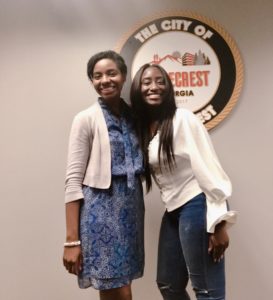
By Michelle DiMuzio, Communications Coordinator
Brittany Lemon, Food Justice Chair of Slow Food Atlanta, discovered her passion for food and the all-encompassing agricultural space at a young age. When she was seven, she supported her family’s produce business at the Atlanta State Farmers’ Market. The idea of starting a family enterprise was sparked by her dad who grew up on a farm.
After gaining academic achievements in agricultural business operations and sustainability environmental management as well as work experience in the agribusiness realm, Brittany has begun a new journey as an entrepreneur in the agrifood world. Brittany moved back to her hometown of Atlanta to jumpstart this undertaking, and in 2019, she formally joined the board of Slow Food Atlanta, leading their food justice efforts.
One of the Slow Food Atlanta projects Brittany is most proud of was pivoting a new communication strategy with students and eventually organizing the Slow Food Atlanta Collegiate Community at the beginning of the pandemic in 2020. This community grew rapidly from its inception and was able to connect consumers to farmers by conducting virtual joy and justice chats with urban growers; through these chats, viewers were able to learn more about the farmers’ background and operations, which sparked virtual walkthroughs and crop identification discussions. The Slow Food Atlanta Collegiate Community includes a diverse group of students, primarily graduate level, who attend various colleges and universities in metro Atlanta.
 Brittany also recently spearheaded a collaboration with the Georgia Institute of Technology MBA program, in which students offered pro-bono consulting for several important local issues. This included assessing the metropolitan area for local food providers such as urban farmers and community organizations, identifying food-provided proximity to food-insecure neighborhoods, and providing recommendations to bridge the food access gap. Brittany met with the students weekly to provide further context about food justice in the city and stimulate thought-provoking discussions. The study was transformed into a mapping tool and as a result has engaged multi-stakeholder partnerships to improve and sustain food security in Atlanta. The following year, Bridget Graf, a student from the consulting project, decided to extend these efforts through her independent graduate study. By shadowing Brittany and conducting qualitative research, she was able to implement the prescribed recommendations. Today, Bridget is a Communications Co-chair at Slow Food Atlanta.
Brittany also recently spearheaded a collaboration with the Georgia Institute of Technology MBA program, in which students offered pro-bono consulting for several important local issues. This included assessing the metropolitan area for local food providers such as urban farmers and community organizations, identifying food-provided proximity to food-insecure neighborhoods, and providing recommendations to bridge the food access gap. Brittany met with the students weekly to provide further context about food justice in the city and stimulate thought-provoking discussions. The study was transformed into a mapping tool and as a result has engaged multi-stakeholder partnerships to improve and sustain food security in Atlanta. The following year, Bridget Graf, a student from the consulting project, decided to extend these efforts through her independent graduate study. By shadowing Brittany and conducting qualitative research, she was able to implement the prescribed recommendations. Today, Bridget is a Communications Co-chair at Slow Food Atlanta.
Slow Food Atlanta has also been prioritizing community partnerships, evaluating the best ways to engage. “The main concern for me right now is not only building a presence in marginalized communities, but having representatives of such communities be a part of our committee,” Brittany explained. “I am pushing that envelope to have residents of the community that we are trying to impact be a part of our organization. They will have a better understanding of what the needs are in their respective communities and know how to mobilize targeted goals effectively.”
While Brittany and Slow Food Atlanta have been working extensively with community partners, the city of Atlanta has worked in tandem with their dedication to providing fresh food; the city has implemented a goal for 85 percent of residents to reside at least half a mile away from a designated fresh food access point. They have also updated coding and zoning to allow urban farms to sell directly to consumers. “There are a growing number of urban farms in the city, which are specifically operated by women and people of color,” Brittany shared. “Being aware of this information drives me to want to do more in ways of amplifying these farmers’ voices and providing resources that can help them thrive even when adversity lingers, which in turn helps surrounding communities thrive with access to fresh food. This is where the joy and justice intersect.”
with community partners, the city of Atlanta has worked in tandem with their dedication to providing fresh food; the city has implemented a goal for 85 percent of residents to reside at least half a mile away from a designated fresh food access point. They have also updated coding and zoning to allow urban farms to sell directly to consumers. “There are a growing number of urban farms in the city, which are specifically operated by women and people of color,” Brittany shared. “Being aware of this information drives me to want to do more in ways of amplifying these farmers’ voices and providing resources that can help them thrive even when adversity lingers, which in turn helps surrounding communities thrive with access to fresh food. This is where the joy and justice intersect.”
Since Brittany’s time on the board, Slow Food Atlanta has grown their Food Justice Committee, in which new members have joined and expanded their content and programming with community partners around Metro Atlanta. These partnerships include working with Open Hand Atlanta and Wholesome Wave Georgia, to provide logistical support for cooking classes that cater to low-income residents. Their plans for 2022 are just as ambitious; this year, Slow Food Atlanta plans on highlighting new and/or underrepresented farmers’ markets by conducting tours, giving space to BIPOC, immigrant and refugee partners. Their programming also includes engaging their social media following with interactive campaigns and expanding their book club with a quarterly food justice related book feature and author-led discussion.
 Brittany is no stranger to the joy and justice of food. “Joy and justice in the food system happens when everyone, particularly our marginalized communities, can have confidence and a direct relationship with their food source. Building interconnected food systems in which consumers, farmers, restaurant partners, food service organizations, climate experts, and the like, are invited to the table to discuss pressing matters to formulate solutions together can nourish everyone in the long haul— that’s what joy and justice looks like,” Brittany expressed. “Food choices are not built by a one-size-fits-all model; food does not grow in a vacuum. Natural healthy foods come in various forms and, unfortunately, our local grocery store doesn’t supply every food item. As food leaders and even influencers, we must be open to learning cultural distinctions of food that go beyond our very own plate. That’s why it’s very important for our committee members (community members) to have direct conversations with farmers who grow for surrounding communities and for our restaurant partners to source culturally-appropriate food for our communities from our local farmers. It’s all interconnected.”
Brittany is no stranger to the joy and justice of food. “Joy and justice in the food system happens when everyone, particularly our marginalized communities, can have confidence and a direct relationship with their food source. Building interconnected food systems in which consumers, farmers, restaurant partners, food service organizations, climate experts, and the like, are invited to the table to discuss pressing matters to formulate solutions together can nourish everyone in the long haul— that’s what joy and justice looks like,” Brittany expressed. “Food choices are not built by a one-size-fits-all model; food does not grow in a vacuum. Natural healthy foods come in various forms and, unfortunately, our local grocery store doesn’t supply every food item. As food leaders and even influencers, we must be open to learning cultural distinctions of food that go beyond our very own plate. That’s why it’s very important for our committee members (community members) to have direct conversations with farmers who grow for surrounding communities and for our restaurant partners to source culturally-appropriate food for our communities from our local farmers. It’s all interconnected.”
For her personal joy, Brittany discussed her love of travel and specifically visiting family owned restaurants and sparking conversations. “The word commensality isn’t used enough — the act of the term isn’t encouraged enough, ” Brittany stated. “Coming together to eat food that nourishes our bodies and having dialogue that nourish our minds is needed. Richness in food and conversation coexist in commensality. That’s what gives me joy.”
Throughout the implementation of joy and justice initiatives, Brittany and Slow Food Atlanta have ensured the values of good, clean and fair provide the foundation for their work. “Good, clean and fair food for everyone is intersectional and related to how we can lean into a more sustainable food system,” Brittany explained. “The intersection of good, clean and fair principles ensures nutritious, affordable, fresh food is equitably distributed in communities while keeping cultural and ecological preservation at the forefront. As a chapter, we have recognized this intersection to be a driving force for cross-functional collaboration and interconnectedness which helps us, as a team, to reach a diverse and larger audience. Most importantly, food justice should not be siloed but rather prioritized in every aspect of the movement.”
Slow Food Atlanta have ensured the values of good, clean and fair provide the foundation for their work. “Good, clean and fair food for everyone is intersectional and related to how we can lean into a more sustainable food system,” Brittany explained. “The intersection of good, clean and fair principles ensures nutritious, affordable, fresh food is equitably distributed in communities while keeping cultural and ecological preservation at the forefront. As a chapter, we have recognized this intersection to be a driving force for cross-functional collaboration and interconnectedness which helps us, as a team, to reach a diverse and larger audience. Most importantly, food justice should not be siloed but rather prioritized in every aspect of the movement.”
As Brittany’s Instagram account reveals, she is a lady who wears many hats. Beyond Slow Food Atlanta, Brittany is an Independent Sustainability Consultant for businesses that need improvement in their value chain by means of operational coaching, life cycle modeling, and social responsibility reporting. She recently founded Ripe Retreat, which is a social enterprise that plans to revive the global food system by strengthening the agri-food economy, promoting the preservation of foodways, and ultimately driving an intersectional and sustainable approach to agritourism. In essence, Ripe Retreat will provide an online marketplace for hosts such as farmers, ranchers, and restaurateurs to promote their available accommodations, including lodging and entertainment to potential customers. A percentage of each booking will go to the sister nonprofit, Ripe Mind Project Inc, a nonprofit that promotes food and environmental justice through service and social activism.
Through Brittany’s travels across the globe, she has met numerous people, listening to their stories and aspirational insights to create a better food system and a better world. “So many people are inspiring and have these innovative ways of building a just and greater future for everyone,” Brittany shared. “These diverse perspectives can influence momentous change. More passion is needed, more voices are needed and more perspectives are needed from people that have the desire, integrity, and skills to do the work. I want everyone to experience joy in a way that feels just and delectable.”
To learn more about Brittany and her initiatives, check out her website.
To learn more about Slow Food Atlanta visit their website.

